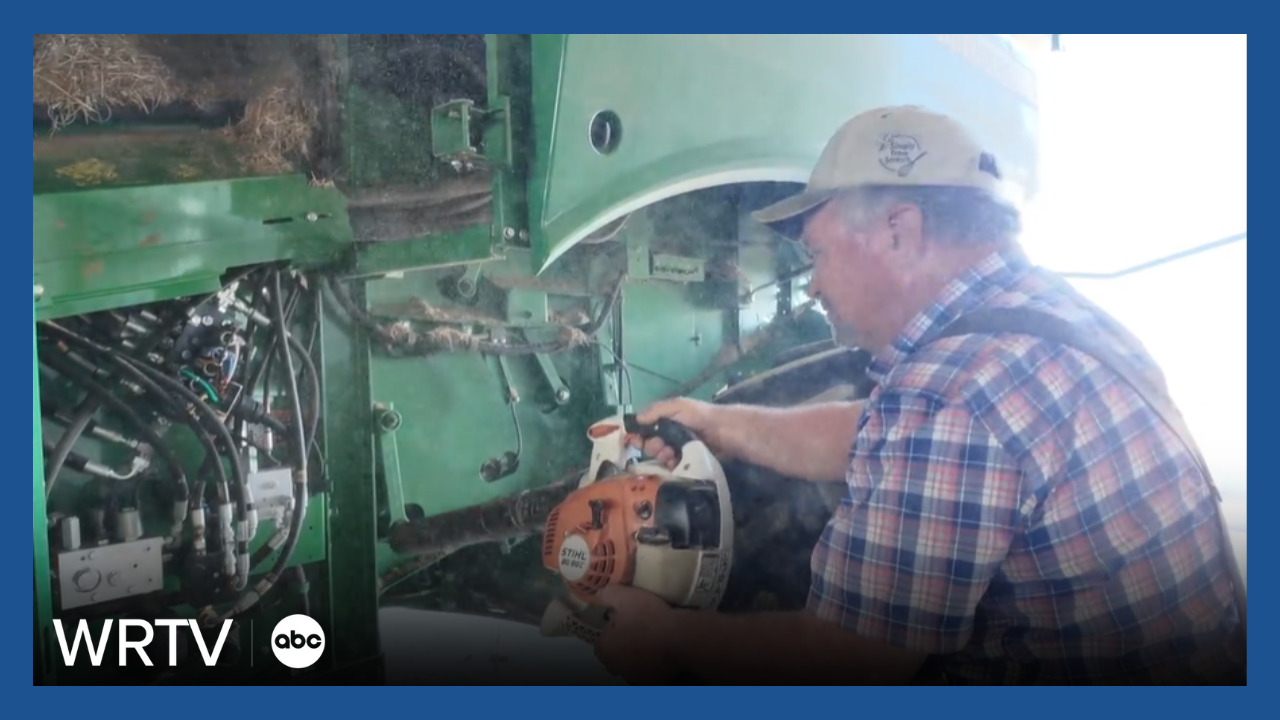JOHNSON COUNTY — Dust is part of everyday life on the farm.
While it is small in size, it can have a big impact. Whether it is dust from the fields being harvested or dust from livestock bedding, farmers are constantly breathing it.

Shalee Bradley is the Agriculture and Natural Resources Educator for Purdue Extension in Johnson County. Bradley advises farmers on a variety of safety topics, including their health.
"They're a little bit stubborn, right?" Bradley said with a grin. "You have to stay on top of farmers to make sure they're getting the necessary help that they need."
Simply being around dirt, dust and debris on the farm doesn't mean your lungs need immediate help.
"Yes, farmers are at risk," explained Dr. Alan Hyslop. "But not everyone's going to develop symptoms. Your own body actually does a pretty good job of filtering out all the particulates."

Dr. Hyslop is a critical care pulmonologist with IU Health. He explained that farmers could be at risk for lung problems because of dust inhalation.
"There's a chance for that type of material that if you inhale it into your lungs, you can develop a reaction to it that can manifest in certain symptoms like chronic coughing, wheezing, chest tightness," continued Dr. Hyslop.
Some farmers may have heard some of these symptoms referred to as farmer's lung.
Should farmers wear a mask to prevent dust inhalation? Dr. Hyslop says it is a good idea if you have underlying breathing problems, like asthma.

Dr. Hyslop also says to monitor any symptoms you're having.
"For someone who's just having an occasional allergic reaction," Dr. Hyslop started, "Like a cough or just a little runny nose, I think that's okay to not necessarily seek medical treatment."
In other cases, your breathing problems could be a reason to see the doctor.
"Fevers, or shaking chills, or drenching sweats at night, things that would just be a little unusual to have," Dr. Hyslop listed. "Coughing accompanied by different colored sputum or phlegm, or if you're just having tightness in your chest or pain in your chest that's more than what you should be experiencing, those could all be signs that there's something more serious."
How long do you need to be around dust in order to have breathing problems? It could be as quick as a single exposure.

"I have seen people be exposed one time for thirty minutes to an hour, and they will develop a very sudden, severe reaction," Dr. Hyslop described. "You're being exposed to something in the environment, and that thing is causing your body to have a severe reaction, specifically targeted within the lungs."
Other problems come from repeated exposure to dust and debris over time.
"I've also seen the other side of the spectrum," Dr. Hyslop continued. "Doing some sort of occupation for a long period of time, and over that long period of time, they developed the symptoms of asthma, or COPD, and they do have chronic lung disease from that."
I visited Jim Flanders on his family's farm in Noblesville. While there, he demonstrated just how dusty his job can be as he cleaned his combine.
"We take this leaf blower and blow components like this off, so that we have less dust to catch fire," Flanders explained.

Dust from the fields he's harvesting collects each day on the combine, so blowing the dust off is a daily chore.
Once inside the cabin of the combine, Flanders says he can breathe easily. Since modernized cabins are pressurized, dust from the fields is pushed out when the door is opened.
"Even though we've harvested most of our soybeans this year, the cab is actually very clean compared to what it used to be," Flanders explained. "There used to just be layers of dust in here, and you'd sweep it out multiple times a year."
Today, the cab's floor was dust-free.
Flanders says he doesn't have any breathing problems doing what he loves, but one of his farmhands has COPD.
"I need to make sure he's in a pressurized cab, and he's good all day," Flanders said. "If he's out in the dust, he has issues."

Time is precious during harvest, but Shalee Bradley recommends taking time to grab a mask when you're in the dust.
"We have to be able to take care of ourselves in order to take care of our crops, and take care of our land and livestock," Bradley reminded farmers.
"We're just dealing with natural, inherent risks that God creates, that we are not necessarily in control of," Flanders said. "We just manage those risks the best we can."






